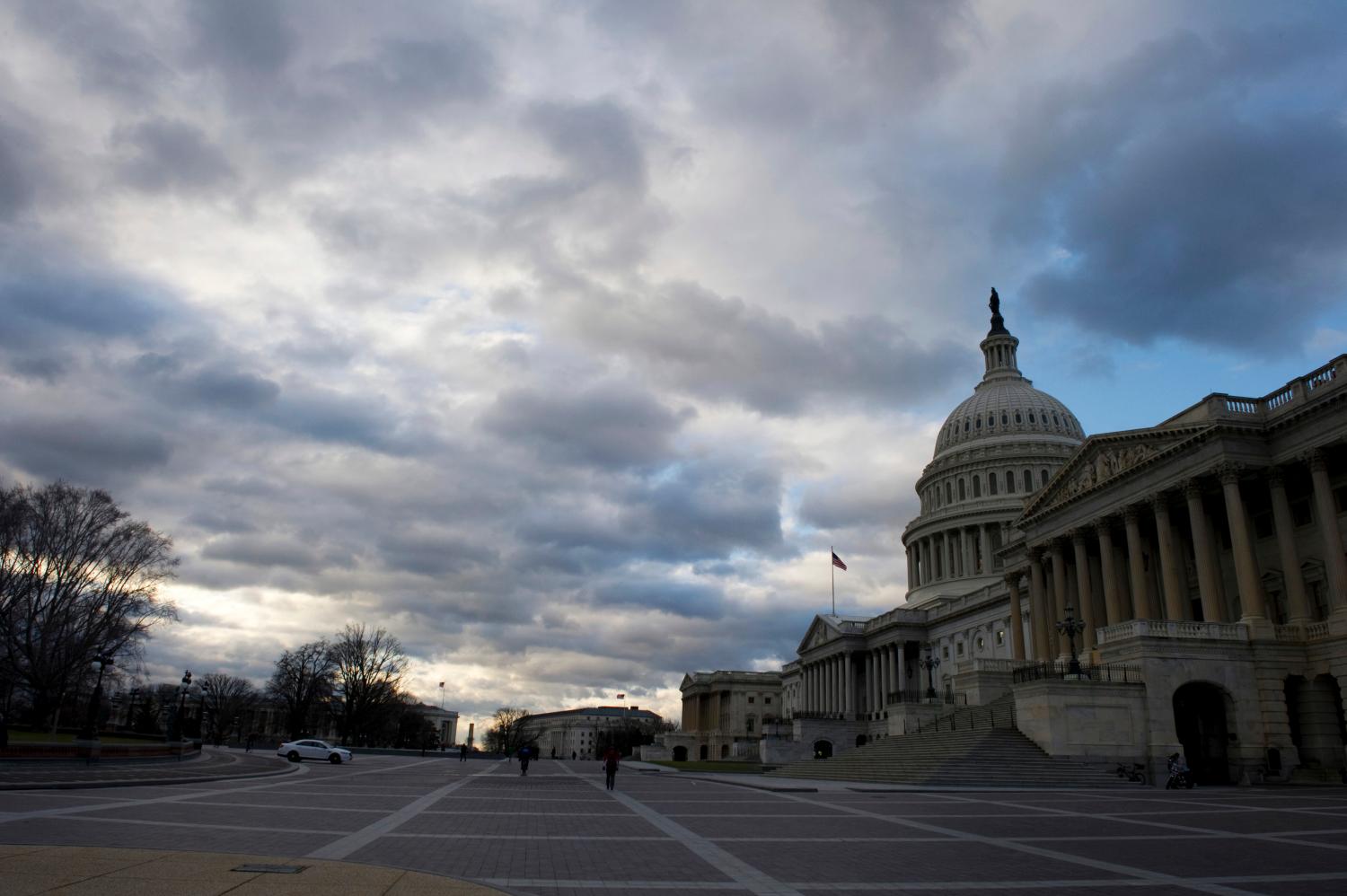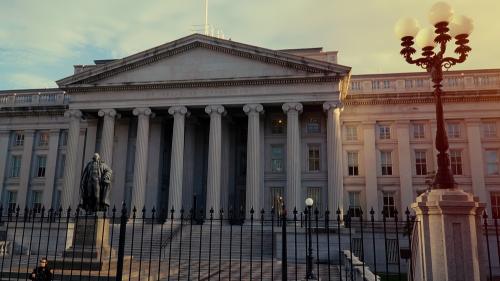In a comprehensive review of the troubled Internal Revenue Service, a congressionally created commission has recommended radical changes that would place substantial tax powers in the hands of private citizens. The sweeping reforms, recommended by the National Commission on Restructuring the Internal Revenue Service, would fundamentally alter the structure of one of the nation’s oldest and most powerful government agencies. There is simply no precedent in American history for transferring such substantial government power to private hands.
The commission concluded that poor service to taxpayers and poor management cripple the IRS. It recommends that tax policy and tax administration should be divided, with policy left to officials in the Treasury Department and administration left to a reformed IRS under control of a new, private, seven-member board. Five of the new board members would come from the private sector, presumably from the ranks of corporate America. In this way, the commission concluded, private-sector techniques would be put to work to solve the IRS’s widely acknowledged management problems.
Unquestionably the IRS needs fundamental reform. The commission concluded that relying on private management and governance could solve the IRS’s fundamentally public problems. But this approach is deeply flawed. It fails to take into account the problems of conflicts of interest, accountability, and even-weaker governance that such a system of part-time private board members would inevitably entail.
Far better would be a three-pronged strategy of real reforms: investing the IRS with strong political leadership from the Treasury’s top ranks, increasing its strategic thinking capacity and improving its management structure.
POLICY BRIEF #22
The Internal Revenue Service is unquestionably a troubled government agency. Tax collectors have been wildly unpopular since biblical times, but today’s unhappiness with the IRS goes far beyond even great American traditions like dumping tea into a harbor rather than paying a tax. Incorrect answers to citizens’ tax questions, long telephone waits to get any answer at all, tax employee snooping into confidential files, and billions poured into a tax system modernization that the General Accounting Office has called chaotic—these nagging problems have made the IRS perhaps the federal government’s least-favorite agency.
| Summary of The Commission’s Recommendations
For the Executive Branch: Create a board appointed by the president that would contain seven members—made up of five members from the private sector, the Secretary of the Treasury, and a representative from the IRS’s union. For the IRS: Apppoint the IRS commissioner for a five-year term and pay a competitive salary. |
Modernize IRS technologies: prioritize the century date change and develop a long-term strategic plan for technology. Develop a strategic marketing plan to make electronic filing the preferred means of filing tax returns with a goal of 80 percent electronic filing by 2007. For Congress: Coordinate congressional oversight of the IRS through regular meetings of the leaders of committees having jurisdiction over the IRS. |
Though most of its detractors acknowledge that the IRS has made real strides in recent years, its continuing difficulties prompted Congress in November 1995 to create the National Commission on Restructuring the Internal Revenue Service. The commission’s June 1997 report boldly proclaimed A Vision for a New IRS. The report is bold, especially in self-consciously admitting Congress’s complicity in the complexity of the tax code and the unpredictable funding that makes long-term IRS planning impossible.
However, the report is also fundamentally flawed in its most significant recommendation: a transformation of IRS’s governance. It confuses the undeniable need to strengthen the IRS’s leadership with a plan to turn the agency over to a board dominated by private officials.
The Commission’s Recommendations
The commission’s central recommendation is to create a seven member board of directors to govern the IRS. It would be charged with setting basic management strategy and overseeing IRS operations. Its members would be appointed by the president, confirmed by the Senate, and removable by the president. Five of the commission’s seven board members would come from the private sector; they presumably would be drawn from the ranks of corporate leaders.
The commission proposed the new board for two reasons. First, the commissioners were concerned that, despite mounting problems, top Treasury officials had not stepped in strongly enough to correct them. The commission concluded that senior Treasury leaders naturally concentrated on the broad questions of financial policy and invested too little time in the IRS’s management. Second, the commissioners believed that private-sector-style management techniques—most notably, the boards of directors that set broad strategic policy for most private companies—would provide a firmer hand and clearer guidance for correcting IRS’s difficulties. The current IRS governance structure is often reactive rather than strategic, the commission argued. Putting the Treasury Department clearly in charge of developing tax policy, but removing it from administering it, the commission concluded, would solve that problem.
The proposal represents an understandable reaction to critical problems, but it is an unwise, unaccountable, and probably unconstitutional transfer of public authority. Quite simply, throughout American history there is no precedent for vesting such substantial governmental power in the hands of private citizens. The closest analogue in all of the federal government, in fact, lies in the boards at each of the twelve regional Federal Reserve Banks. Like the proposed IRS board, their boards are composed of leading private sector officials and oversee the management of the reserve banks. But unlike the proposed IRS board, they do not exercise governmental functions. At each regional reserve bank, a president (acting in the private-sector model) manages operations; 5 votes on the Fed’s key policymaking body, the Federal Open Market Committee, rotate among the 12 reserve bank presidents. In the end, however, government officials—the members of the Federal Reserve Board—dominate Fed policymaking. Government policy making remains principally in governmental hands.
The Fed’s system of governance has been roundly criticized over the years for vesting too much power in private bankers. The proposed IRS would place vastly more governmental power into private hands—and pose enormously greater problems of accountability. The commission countered that the duties of the Board . . . are those of governance rather than management, a distinction that is practiced effectively by most large corporations. This, however, is a foundation of sand on which to build such sweeping reform, for several reasons.
Inevitable Conflicts of Interest
The report notes that the board members would be subject to the government’s conflict of interest safeguards to prevent the reality, or the appearance, of conflicts of interest. With the proposed board, however, such conflicts of interest are not just possible—they are inevitable. Sooner or later (probably sooner) every private sector member would face a vote that would unavoidably affect the operations of the business or organization from which they came. The only option in such cases would be for board members to recuse themselves from the decision.
Such frequent recusals would surely deepen public distrust in the IRS and undermine its new board. If disclosed conflicts are rampant, taxpayers are likely to wonder how much deeper implicit conflicts might run. Like Caesar’s wife, the IRS cannot afford even a hint of scandal, yet routine recusals would fuel recurring worries.
Moreover, it would be impossible for board members to recuse themselves from all conflicts, whether real or potential. Suppose board members recused themselves from decisions with direct implications for their company. What should they do about the next round of decisions on the budget, management strategy, or information technology that affect the part of the IRS that caused the company tax troubles to begin with? If board members recused themselves when second-order conflicts arose, within a short time all board members would find themselves disqualified from most key votes, and the board would be rendered impotent. If board members did not recuse themselves, they would undermine public confidence in the reinvented IRS. Either way, the conflict-of-interest trap would destroy the new board.
Weak Leverage by Part-Time Board Members
The board members would be part-time officials, assisted by a small permanent staff. Board members could not possibly exercise the responsibilities that won their appointment to the board and devote full energy to the IRS’s problems. The Federal Reserve Board has a powerful staff, but it has an even more powerful, full-time board of government officials to supervise it and keep it in check. No part-time board could possibly exercise the same control. If the board exercised substantial power, the real power would rest in the board’s staff. If the staff were not so powerful, the board would find it difficult to exercise effective oversight over the IRS. Either way, governance would suffer.
Accountability
The 16th Amendment to the U.S. Constitution gives Congress the power to impose income taxes. But long-standing constitutional practice dictates that Congress cannot delegate the exercise of governmental power to a private entity. That, of course, is just what the board is—a private and independent entity vested with governmental power. Its very existence would be open to serious constitutional question.
Moreover, the commission attempted to deal with the difficult and critical questions of where responsibility rests by drawing two sharp boundaries. One boundary was to rest between policymaking (the responsibility of Congress and top Treasury Department officials) and governance (vested in the new board). The other boundary was to rest between governance and policy execution (vested in the commissioner of the IRS and the service’s staff).
There are two fundamental problems with such division of responsibility. One is the question of how responsibility would truly work. The model envisioned by the commission is the corporate board answering to its stockholders. But, as the late political scientist Wallace Sayre would have pointed out, the two approaches are similar in all unimportant respects. Congress is not a group of stockholders, but (with the president) it is the ultimate source of the IRS’s policy and the ultimate power to ensure accountability. The commission sought to solve the central problem of accountability for tax policy in a democracy by prescribing precisely the wrong model.
The other is the question of how to separate broad strategic guidance from tactical management decisions. Both theorists and public officials, in the United States and around the world, have fought for more than a century on how to divide policymaking from its execution. This is the single most difficult problem in public management. To solve this problem, the commission wrongly assumes that this quintessentially public problem can be solved by private management approaches—and it fashions an approach more distant from real democratic accountability than any entity in American government.
If the commission had sought to maximize the conflicts in the board’s role, it could scarcely have done a better job. It has proposed a private board to perform a public function. It has created a board likely to constantly trip over itself in conflicts of interest. And in putting the board at the critical crossroads between policymaking and policy implementation, it has put the board in a constitutional never-never land in which the only options are confusion over its role and constitutional challenges over its function. It would be hard to create a messier solution for a more important puzzle.
Toward Real Reform
The IRS unquestionably needs deep reform—but it requires reform that will solve its most important problems, not make them worse while creating new ones, which is just what the commission’s governance recommendations would do. The IRS needs stronger leadership connected directly to the Treasury Department’s top leadership. It is truly reasonable, as the commission suggests, for the IRS to provide more responsive, efficient, and accurate service to taxpayers. However, contrary to the commission’s conclusions, the IRS can never be a customer-centered financial service organization like a mutual fund or a neighborhood bank.
What could improve the IRS’s governance and strengthen its leadership? Although IRS is just one agency among many in the Treasury, its employees dominate the department’s work force. In implementing tax laws, they have tended to labor in relative obscurity, apart from the high financial policy debates that preoccupy top Treasury officials—until problems or controversies within the IRS demand their attention. A policy of laissez-faire except for damage control can never provide the effective political leadership that the IRS needs. The critical problem, as the commission identified, is bridging the gap between policy and execution. The commission’s plan of bridging the gap with a private board is distinctly ill-considered. So too is its basic plan to vest key management decisions in a board. Boards are excellent in providing a forum for consensus building and gathering ideas, but they are poor for framing management strategy.
A far more effective effort would build on a three-pronged strategy. First, the IRS needs strong political leadership from the Treasury Department’s top ranks. The leadership that the IRS needs can come only from the department’s secretary. The needed strategic thinking and departmental support ought to be coordinated by the department’s deputy secretary, operating vigorously as the chief operating officer envisioned by recent reforms proposed for the top levels of cabinet departments. Together they can ensure that the IRS is steered in the right direction.
Second, the Treasury Department ought to rely on its new IRS Management Board for strategic thinking. It would be a mistake for the IRS to report to this board, but its diverse Treasury Department members can provide the high-level guidance that the IRS badly needs.
Finally, the IRS commissioner and the agency’s top staff ought to be hired on five-year management contracts, held strictly accountable for the agency’s performance, and rewarded for superior achievement. The commissioner ought to bring substantial management experience to the position; the job in its essence is far more managerial than policy making. The management contract approach has worked well for such positions in the management reforms implemented in the United Kingdom and New Zealand. It would provide both the professionalism and accountability that the IRS needs.
No matter what reforms the IRS pursues, of course, they will never stick unless Congress fully supports the effort. The complexity of the tax code is the product of legislation, not the whim of IRS lawyers. The difficulty of answering taxpayers’ questions is much more the product of preferences Congress has woven into the tax code, not incompetence of IRS employees. The difficulty of planning long-term investments in new technology lies in part with the IRS’s own capacity but far more in Congress’s unwillingness to make a plan and stick to it. No reform can transform the nation’s tax collections until Congress first makes clear its own commitment to a clear, fair, and effective revenue system.
But with congressional support and sharply focused reforms, the IRS can be significantly improved. Taxpayers will never like its functions, love its employees, or find the same level of satisfaction they seek in their banking services. But having the IRS report to a board dominated by private interests is likely to push the IRS even deeper into the problems it is struggling to escape.
The Brookings Institution is committed to quality, independence, and impact.
We are supported by a diverse array of funders. In line with our values and policies, each Brookings publication represents the sole views of its author(s).




